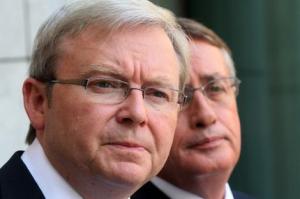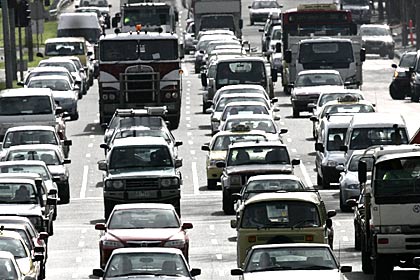A big review whets people’s appetite for change. If taking a super-sized bite out of mining company profits with a resource rent tax is suddenly regarded as “underwhelming”, “safe” or “pragmatic”, it is only because the media have seen some of the fancier items on the Henry tax review menu.
Swapping metaphors now…
Policy making is like war – long periods of extreme boredom, interspersed with brief periods of extreme panic. A review opens a ‘policy window’ – a period where people expect and are open to change – that sends good policy makers over the trenches. A policy window is a bad thing to waste. While to some extent the lack of gusto to reform is a result of the GFC, to some extent it is due to the Government’s Fear and Cowardice…

The Henry review itself says not everything should be implemented at once. But once a review gets a few years old, the ideas in it (like lifting the tax-free threshold to $25,000) stop looking fresh. After an electoral cycle, you’d need to convene a review to review the review. The chance of something being plucked from the dusty pages and implemented seven years from now is remote.
To lock in change, someone needed to make up an implementation schedule. It could have been in the Government’s response, if not in the review itself.
All that said, I like the Norway model of socialising (and saving) resource profits. It embodies intergenerational equity – our grandchildren can benefit as much as we do from what will be dug up. But I want to focus attention on something that has flown under the radar, but, happily, didn’t get onto the Government’s NOT TO DO list.
Road tax.
If a good is communally owned and underpriced, it will not be efficiently allocated. Punt Road is no different from the crusty, sawdust-infused ХЛЗБ (bread) of my faintly-remembered youth.*

To combat this, you need proper pricing.
And, in one of the most theoretical parts of the review, Henry proposes a comprehensive road tax. This is exciting. It says:
Faced with an imbalance between demand for road space and its supply, one option is to increase the supply of roads. While this may have worked in the past, it is likely that for most major Australian cities the cheapest supply-side options have already been taken.
i.e. We’re done building roads, we just need to make sure they’re not used by every last bozo with a faint desire to go across town.
Most people’s understanding of economics doesn’t centre on ‘allocative efficiency’ – the idea that scarce goods should only go to those who value them most. But that’s the effect that prices have. The people who most want something have to vote with their wallets to get it. If a business values the flow of benefits (in their case, revenue) more than the cost, they should have it. If a private citizen values the benefits (in their case, derived happiness) more than the cost, they should have it.
The problem with the market for roads is a lack of allocative efficiency. Most roads can be used by anyone, for free. In fact, congested roads are used by people who have the most time to kill. These are not people who value the road.
The road use charge replaces the more complex system of fuel tax and fuel tax rebates. Fuel tax is a ‘blunt instrument’. It’s not a carbon tax, not a particulate-pollution tax. It over-charges non-damaging driving, such as on non-congested roads, where there are no alternatives; and it does too little to discourage driving in congested areas where better options might exist.
The plan also proposes charging trucks for the road damage they do. Road damage rises exponentially with weight. This (combined with some fancy competitive neutrality charges) could do wonders for the rail freight trade.
Sensible road charging largely failed to make the media response to the Henry review at all. The Government has left the door open to include some more measures from the tax review in next week’s Budget. Let’s hope road user charging is among them!
* There are no such memories. Your author was born to a comfortable home in Melbourne’s eastern suburbs.


It’s probably worth a concession, in small print down here. My predictions about negative gearing, found in the article Bizzarre Love Triangle: Can Henry squeeze inbetween Tony and Kevin? failed to materialise in the Henry review.
Still, the depth of the response to the review matches the breadth of the gap in the polls. i.e. paper thin.
LikeLike
Interesting post. Has anyone looked at the cost of implementing the road pricing? I have heard suggestions of using GPS based systems. Singapore has an ERP system (Electronic Road Pricing) that uses overhead gantries and in vehicle transponders with some kind of stored value card. I don’t know what the cost of this system is to run, but it does seem to change peoples behaviour and they don’t seem to suffer from gridlock. They also have a clever auctioning of COE’s (Certificate of entitlement) that people have to bid for before they can buy a car. These are made available in limited numbers and last for 10 years and have cost $30+k in the past. Not sure about now.
LikeLike
Isn’t citylink already a road tax? except the money doesn’t go to the government. I think you can really only tax the roads where people have other options, ie public transport or proximity to the city which gives you cycling and walking. With most subruban trains currently at capacity during peak hour, what behaviour change would flow from a road tax? Build the PT and people will use it.
Followinng on from Michael’s comment, in some parts of Eurpoe it’s really hard to get your licence. Could be a way to stop more people driving while upskilling the ones who do drive. Maybe ‘how to drive to avoid congestion: rubbernecking only makes things worse’ could be a component.
LikeLike
CityLink/EastLink toll to pay the road costs. They aren’t congestion taxes.
Either way though, even by modern standards of ignoring the constitution, this is a State government matter, not a Federal one. And the Brumby government, at least, made their stance on tolls pretty clear when the VCEC suggested them:
LikeLike
Yet-another-tax is almost never the right answer.
The most serious challenge facing our country is not road conjestion or pollution or global warning. The challenge is how to curtail the spreading stain of government, which consumes our fortune and produces nothing.
Think again.
LikeLike
I suppose that you oppose cigarette taxes and petrol excises as well? Government can be run a lot more efficiently on the spending side, but conflating the issues of taxing and spending smacks of ideological dogma to me.
LikeLike